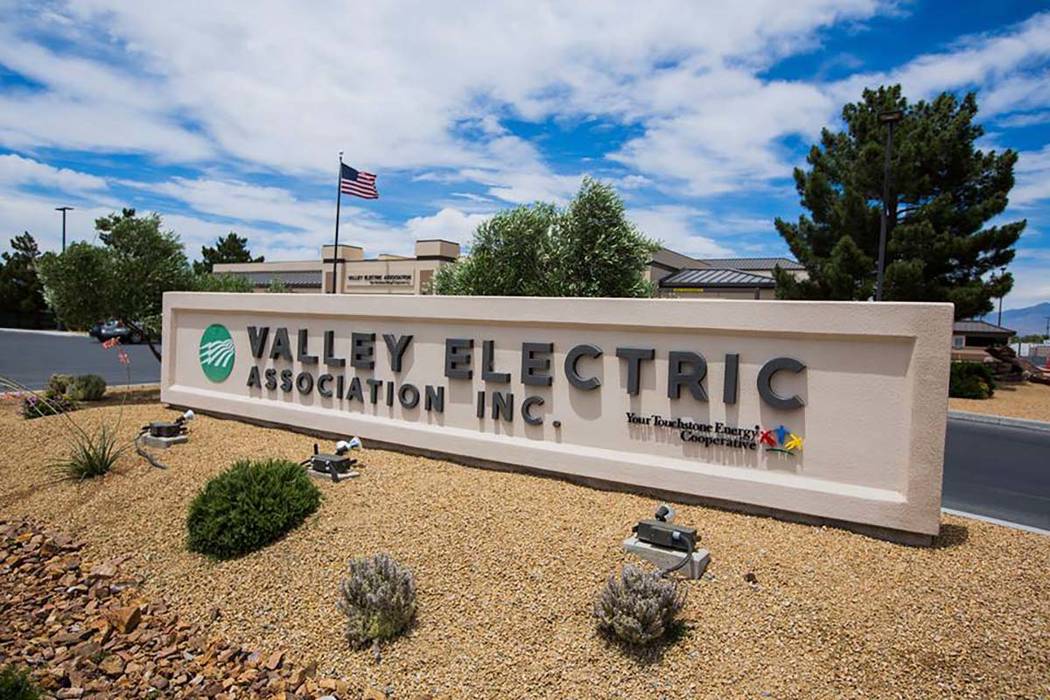Valley Electric’s interim CEO speaks out on Nevada solar regulation
The interim leader of Valley Electric Association Inc. is slamming Nevada legislation on net metering.
“The approach that this state is using in going after renewables on a residential basis is outrageous to say the least,” said Dick Peck, chief executive of Valley Electric.
Peck was referring to Assembly Bill 405, which was passed during the 2017 Nevada Legislative Session and signed into law by then-Gov. Brian Sandoval. The law sets parameters for some Nevada utilities on net metering, where those with rooftop solar get a credit for the excess energy they return to the grid.
“I believe it’s unconscionable when it comes to rural utilities, smaller utilities, and the subsidy that people are having to pay that don’t have solar,” Peck said in an interview.
“The wholesale power rate is approximately 4 cents per kilowatt-hour, but we had been paying our member-generators 11.9 cents for their excess power,” Peck said in a news release. “We have to always remember that members who do not generate renewable energy are subsidizing those who do.”
Though Valley is exempt from the legislation, Peck said the co-op is working to implement a policy that mirrors the structure of Assembly Bill 405; however, he doesn’t agree with the approach of the overall law.
“If the state of Nevada would go after the CO2 (carbon dioxide) issue, which is really the issue…and come up with a tax of some form or some way here in the region to take on the CO2 issue,” Peck said, “It would be ethical and a way to resolve the problem.”
“What the state of Nevada is trying to do is absolutely wrong,” Peck said. “They’re going down the wrong path. What we have in this world is an issue with CO2. It is a major problem …”
Peck said that a lot of signs of climate change, which many in the scientific community have stated is being driven by the rise in carbon dioxide and other greenhouse gases, can already be seen in his home state of Alaska.
“We’re having impacts that are just outrageous—glaciers are melting, the tundra is thawing, hundreds of millions of tons of methane gas is escaping from the whole tundra up there, and it’s creating all types of issues, major issues,” he said. “I don’t know if we can slow it down. I really don’t.”
Peck does see a solution to mitigation of the rising level of carbon dioxide in the atmosphere with creating a flat carbon tax.
“When all the dealing is done in trying to come up with methods of not producing carbon, and that is what all the renewable issues are all about,” Peck said. “If you want to turn and be fair and equitable, you charge everyone a carbon tax, then turn around and take that money and the state provide renewable energy facilities. That’s the best way to do it. You tax everyone fairly and equitably instead of turning around and providing these goofy subsidies. It doesn’t make any sense.”
Peck said Assembly Bill 405 is not the solution to climate change and shifts costs to people who can’t afford it.
“The only way that we can deal with our climate change is reduce carbon CO2 issues—reduce the amount of it,” he said. “This AB405 doesn’t do anything for our climate issues and shifts the cost to the people that can’t afford it.”
According to Peck, ratepayers that don’t participate in the net metering program are subsidizing Valley members that do.
“Even though some say it’s economic development, well, it’s not economic development, because when the dealing gets done, somebody’s got to pay the bill, and right now, it is Valley Electric ratepayers that are subsidizing all of the solar panels that are being installed,” Peck said.
Peck does believe that renewables need to be considered.
“I believe very strongly that we need to consider renewables but not the way the state of Nevada’s laid out,” he said. “It is a misjustice of legislative incompetency that just blows my mind.”
Peck said Valley’s board wants to be a part of the solution.
“The board realizes that we’ve got a climate issue,” he said. “We’re trying to be part of the solution, but in the meantime, we need to educate our legislators and the community that the current method of putting renewables out there is a very costly and unaffordable endeavor.”
Valley’s net metering policy
Under Valley’s current net metering policy, solar customers interconnected to the co-op’s grid are paid 100 percent of Valley’s full retail rate of 11.9 cent per kilowatt hour for energy returned to the grid.
That could change on June 26 as Valley’s board takes up the possibility of bringing in a new net metering policy. The meeting is set to begin at 8:30 a.m. at the co-op’s administrative offices at 800 E. Highway 372.
A proposed policy could move customers with solar to a tiered system where those with solar would get 75-95 percent of the current rate, “depending on when the member-generator interconnected with the VEA grid,” according to a news release from Valley.
For Tier One, where members who interconnected with Valley prior to the generation amount exceeded 1.25 megawatts, those members will receive 95 percent of the full retail rate of 11.9 cents per kilowatt hour. That threshold was crossed in 2015, according to a news release from Valley.
Under Tier Two, members will receive 88 percent of the full retail rate. This tier includes members that brought the generation from 1.25 to 2.5 megawatts, which occurred in 2017, according to Valley.
Tier Three will be paid 81 percent of the full retail rate for excess energy. This group brought the generated amount from “2.5-3.75 megawatts” in 2019.
Tier Four members will be reimbursed 75 percent of Valley’s full retail rate.
“The majority of VEA’s generation of renewable energy by members comes in the form of solar, but some members generate power with wind turbines,” Valley’s release stated. “Since the total number of applications in house would bring the system size to nearly 6 megawatts, virtually all new applications would be reimbursed at 75% of the retail rate.”
Valley has over 600 members that currently participate in Valley’s net metering program.
According to Peck, the number of member-generators has grown significantly in the past couple years, which is prompting the need for revisions to the co-op’s policy.
Contact reporter Jeffrey Meehan at jmeehan@pvtimes.com. On Twitter: @pvtimes



















